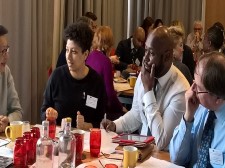Project Updates
WW1 Engagement Centres Policy Statement
On 10, Mar 2020 | In Project Updates | By Nicola Gauld
In 2019, the WW1 Engagement Centres held a series of legacy festivals and policy breakfasts. The following statement was written for the final event, held in London in November 2019.
KEY POLICY STATEMENT FOR MAKERS
Heritage is a major resource for empowering communities. In a rapidly changing, globalised world, heritage can foster a sense of identity, security and belonging. Innovative research and community partnerships can address contested heritage and strengthen human connections across time and place. A collaborative model of heritage has potential to shape new policies and practice, creating more resilient communities for the future.
Universities have a key role to play in bringing people together to commemorate events of national significance. They are uniquely placed to connect academic and public knowledge of the past, enabling diverse communities to tell their own stories of belonging and contribution. Universities can facilitate processes that develop and share new understandings, that sustain an inclusive, rigorous, rich heritage, and that respond to the challenge of divisive and uncomfortable histories.
FIRST WORLD WAR ENGAGEMENT CENTRES: BROADER LESSONS LEARNT
- Collaborative work around history and heritage encourages people to explore new stories relevant to their own lives and experiences.
It opens spaces for alternative voices to be heard, creating multi-layered stories. - Operating across the UK can bring different stories into focus and enable discussion of contested and uncomfortable pasts.
In aiming at a more inclusive heritage, including new shared histories, collaborative research has the potential to challenge received narratives. It can incorporate broader global perspectives. - A sense of place and the local are critical to many community participatory projects.
Place-based institutions can contribute significant expertise. If universities are to fulfil their civic responsibilities and meet the needs of local communities, relationships must be sustained. - Partnerships between universities, cultural organisations and community groups initiate challenging conversations and dialogue.
Productive research collaboration requires clear agreed agendas, open exchange and a sense of everyone being an equal stakeholder. - By devolving research funding to a series of multi-institution hubs it has proved possible to create a structure which facilitates innovation and responsive community engagement.
This model promotes wider understanding and appreciation of what can best be characterised as ‘hidden histories’.



